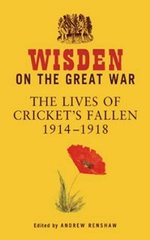Wisden on the Great War
Archie Mac |Published: 2014
Pages: 532
Author: Renshaw, Andrew
Publisher: Bloomsbury
Rating: 4.5 stars

This book may be melancholy, at times depressing and may even make you cry, but in the end it is a great read and is highly recommended.
Editor, Andrew Renshaw, has not only included every obituary published by Wisden in relation to the Great War, he includes information previously overlooked and corrects factual oversights. Added to this he has also written a number of obituaries originally missed by Wisden.
The errors in the original Wisdens for the period 1915 to 1919 are understandable when you start to peruse the volume of entries. Sydney Pardon, editor of Wisden during the period and his staff must have been overwhelmed by the amount of cricketing related deaths that occurred. Especially after most thought the War would be over by Christmas 1914, just six months after it commenced.
The sheer volume of the names of those who perished begins to wear you down after a while, especially in the second half. At least in the first half there were a few cases of mistaken identity and Renshaw was able to lift the reader’s spirits with some good news stories. Why hardly any players had premature entries in the final years of the War is not explained. Perhaps Wisden were more careful after being caught out in the early years, but the only one from 1918 was Wilfred Shaw, who although not a first class cricketer had captained his school XI. Shaw eventually died aged 91.
Unfortunately but not surprisingly there are very few feel good stories amongst the entries. We learn for instance that “more than 320 sets of brothers are known to have died on the same day during the war” and some families such as the Brown clan lost four brothers all within 12 months.
Apart from the bloody losses, the other themes that run throughout Wisden on The Great War, are the bravery and selflessness of those who were killed. An example is Francis Townsend, who told the medics to attend to others first as he was buried up to his knees in a trench. After they dug him out it was discovered his legs were missing. Townsend response to the news was “I think I’ll give up football next year”. He died shortly after.
The war certainly touched every facet of society and cricket’s influence also appears to have permeated deep into popular culture of the period. We find some of those featured in obituaries contributed to all sorts of endeavours from inspiring J.M. Barrie with the characters from Peter Pan, to the man who invented the term soccer to the person who came up with the idea of two minutes silence on Armistice day. The last has been an enduring remembrance of those who fell, however you wonder how many of those killed were just considered cannon fodder.
A lack of respect for some of those who fell was summed up by the entry for Arthur Hughes-Onslow, who had played in the Eton XI. Arthur had committed suicide during the war not wanting to face further time at the front. Unaware his father had taken his own life and had not fallen in battle his son was shocked to receive a tax bill for death duties. In the end common sense prevailed and after an appeal the tax was waved.
So after reading this book, if you happen to shed tears for the loss of life, for the futility of war or out of anger for the sheer waste of young men, or even if your eyes remain dry, you will remember Wisden on The Great War as one of the very best and moving cricket books written.






Leave a comment